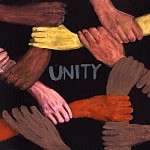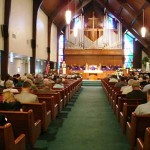You can and must become a leader in church unity… but it may come at a cost
Last week, Ed Stetzer published an interview with Jason Dukes, the author of a new book called Beyond My Church: Thinking and Living So That the World Might Know. (See his post “Beyond My church: A Book Interview with Jason C. Dukes.”)
I like the idea of the book – encouraging followers of Jesus Christ to look beyond the fences created by their “local church” in order to interact with the church of God that is all around them.
In the second question/answer of the interview, Ed and Jason touch on a topic that (I believe) is one of the main hindrances to actualized (real, relational) unity among the body of Christ:
Is this a book that only pastors and paid church leaders can appreciate, or can every follower of Jesus begin to think and live beyond their church, and if so, how?
It is absolutely a book for every follower of Jesus. Two reasons why. First, unfortunately, many pastors live either under the pressure to “grow their church,” which is an extremely anti-biblical thought, or they live stifled by their own insecurities, which creates a sense of competition and distrust between local leaders. Often times, our distinctive understandings of secondary theological ideals hinder pastors’ connection, as well. Thus, it is imperative that every follower of Jesus lead out in cultivating for unity around mission among followers of Jesus in a city, therefore encouraging their pastors to emphasize and prioritize for it.
This can be done in the very ways that they cultivate for “beyond me” living in their families, among their neighbors, in the marketplace, among leaders in the city where they live, and even in the ways that they think of the church in the city. There is actually one chapter per each of those topics in the book, offering suggestions for how “beyond MY church” thinking and living can be cultivated. We need a vision for “on earth as it is in heaven” in the communities where we live, not a vision for succeeding as individual local churches. And followers of Jesus who make up those local church families can be key catalysts in enabling and allowing their leaders to feel secure to think and live “beyond MY church.”
Yes, I agree completely that “it is imperative that every follower of Jesus lead out in cultivating for unity around mission among followers of Jesus in a city.”
However, we must admit that most modern church organization are leader-centric (pastor-centric), even if they do not want to be. So, the influence and desires of the leader(s) carries much weight among the believers who see themselves as part of that “local church.”
What would happen if these followers of Jesus Christ “led out in cultivating unity around mission among followers of Jesus in a city”? Well, they may start giving to needs other than their local church budget. They may start meeting and/or serving with others at times when their local church meets. They may start hanging out with and fellowshiping with people who disagree with their local church statement of faith or covenant.
What is “the pastor” going to say about that?
While I know there are exception, I’ve seen many, many examples of church leaders who are cheerleaders for unity among the body of Christ, as long as it doesn’t affect their own “local church.”
The flock of God that is among you…
I’ve made this statement before, and I’ll make it again here: church covenants are often used to divide the body of Christ. I believe that we are already convenanted with one another due to our mutual covenant with God through Jesus Christ, and we are already in fellowship with one another through the Holy Spirit who indwells all of God’s children. Therefore, church covenants and memberships are unnecessary, and as I said above, can be a hindrance, especially to the unity of the church.
But, some argue, church covenants and membership are necessary (and even assumed in Scripture) because elders are to oversee “the flock of God which is among you.”
This kind of statement is made twice in Scripture:
So I exhort the elders among you, as a fellow elder and a witness of the sufferings of Christ, as well as a partaker in the glory that is going to be revealed: shepherd the flock of God that is among you… (1 Peter 5:1-2 ESV)
[Paul to the elders of Ephesus] Pay careful attention to yourselves and to all the flock, in which the Holy Spirit has made you overseers, to care for the church of God, which he obtained with his own blood. (Acts 20:28 ESV)
(Note: An unfortunate translation in the KJV has perpetuated the idea of elders being “over” the church: “Take heed therefore unto yourselves, and to all the flock, over the which the Holy Ghost hath made you overseers..” While other translations have corrected the preposition “over,” the idea continues.)
For this post, I want to consider the idea of being “among” or “in” the church of God. Peter says that the elders are among the church and that the flock (the church) is among the elders. Paul says that the Holy Spirit has made the elders overseers among the church (or in the flock).
Most people recognize today that “church” points to a group of people – a collective, much like the English term “crowd.” Thus, to be “in the church” or “among the church” would be similar to be “in the crowd” or “among the crowd.” The idea is being part of God’s church – one of the people who make up his flock.
So, whatever group of people Peter and Paul have in mind, the elders and the people are “among” one another; there is no sense of hierarchy in these passages. (This helps us understand how to interpret the noun and/or verb translated “overseer” or “oversee,” since these words have range of meanings that includes the idea of caring for people.)
But, what group of people did Peter and Paul have in mind? Did they have in mind the kind of “local church” differentiation that we see today? In each case, Peter and Paul are talking about multiple elders but only a single church or flock.
The only designation is in the preposition “in” or “among” (it’s the same word translated two different ways). So, which “people of God” is each elder “among”? In the traditional understanding today, the elders are “among” those with whom they share church membership or with whom they have decided to sign a church covenant. However, those same elders are not considered to be “among” other believers if they do not share church covenant or membership.
In this traditional understanding, an elder would not be considered “among” a follower of Jesus Christ who lives next door, or who is a coworker, or who attends the same community group unless that person is also a member of the same “local church” as that elder. Thus, in this traditional understanding of elders, the elder would not be responsible for shepherding or caring for that other person, and in the same way, the other person would not be responsible for shepherding or caring for the elder either.
However, there is no sense of the word “among” in which that person would not be “among” the flock of God together with that elder. If God brings someone into our lives, we are automatically “among” the flock of God together. We do not – and so cannot – choose who is or who is not in the church with us. God makes that decision. Remember that Paul told the Corinthians that God arranges the members of the body, each one of them, as he chooses. (1 Corinthians 12:18)
Imagine how different the church would be – and how much unity and fellowship we would enjoy – if we actually treated one another as the church of God… that is, if we treated all followers of Jesus Christ that God brings into our lives as “our church”… or, as I prefer to call it, “the church.”
The need to live the truth, love, and service
Last week, on my post “Have you signed my ‘Guest Book’,” Arlan left a comment that I would like to highlight so that more people read it and think about it.
In the comment, Arlan is actually introducing himself to me and my readers. But, I think his comment goes along well with several of posts investigating fellowship and unity among brothers and sisters in Christ in spite of various kinds of disagreements. My latest post to discuss these issues was called “Unity and Fellowship: Where do you draw the line?”
Here is Arlan’s comment:
I was raised outside of the regular (institutional) church and have spent most of my life outside of any church. I have had some Christian fellowship, particularly with my own family, but I hesitate to call all Christian contact “church” in the sense of those called out by God assembling for the purpose of mutual edification.
Your recent post on unity and fellowship really strikes a nerve. In most of my childhood my family could not find enough unity to maintain fellowship. As I have tried things out on my own I have more often found too much fellowship without unity–a circle of friends, but not of servants, and without much honesty about the real differences between members.
Church, in all its institutional and organic flavors, seems to be a contest between doctrines and good feelings. On the one side they insist on truth at all costs and forget that God loved us while we were his enemies; on the other side they insist on love at all costs and forget that love without truth is false love–treachery, really. If we neglect to admonish each other we are abandoning one another to our sins.
A year ago I went to a Baptist Sunday school that was more concerned with Being Right and also to a home fellowship that was more concerned with Joy, Peace, and Encouragement. In June I moved and I haven’t gotten with any fellowship since. It is hard to even know how to look.
I’ve been to the Searching Together conference in 2008, 2009, and 2011, which is nice to do once a year; but I feel the need to live the truth, love, and service where I am without yet knowing how.
I appreciate Arlan’s last line especially: “I feel the need to live the truth, love, and service…”
Can we begin by assuming unity in Christ?
Last week, Arthur at “The Voice of One Crying Out in Suburbia” wrote an excellent post called “The Assumption of Disunity.”
He begins his post by giving a quick synopsis of a book called Four Views on the Spectrum of Evangelicalism. If you’re interested in the book, you can jump over to Arthur’s blog and read what he says.
The point that I want to bring out comes at the end of the synopsis. Arthur says that the four contributors to that book assume disunity, not only among the church as a whole, but even among the sub-group called “Evangelicals.” Arthur explains, “All of these conversations invariably work within a framework where the church has just decided to shrug our collective shoulders, throw up our collective hands and just accept disunity and assume it is normal and unavoidable.”
How does Arthur respond to this?
I reject this. I don’t reject it because I think it is not the reality on the ground and has been for centuries. I reject assumed disunity because it is something that the Gospel simply demands that we reject and overcome. There is simply no way to read the New Testament and come away with practices that lead to a disunified church made of up thousands of competing local churches. The New Testament spends a ton of time breaking down the walls between believers and we have promptly spent the last two thousand years building them right back up in new, innovative ways.
Think about this for a moment… What would happen if we assumed unity in Christ instead of assuming disunity based on our traditions and backgrounds and interpretations? Is that even possible? I think it is…
In fact, I want to expressly state something that I hope has been apparent through my blog posts: If I disagree with you, or if you disagree with me, I do not automatically assume that we are divided from one another because of that (those) disagreement(s). Instead, my first assumption is that we are united in Christ – brothers and sisters – whose bond is stronger than flesh and blood and able to withstand our disagreement.
Idealistic? Maybe. But, like Arthur, I believe that the gospel demands our unity in Christ, and I will seek to live in it.
The Sharp Disagreement Between Paul and Barnabas
In Acts 13, God sends Paul and Barnabas out of Antioch into the wilds of the Roman empire in order to proclaim the good news of Jesus Christ and to gather together and strengthen those who begin following Jesus. They took Barnabas’ cousin John Mark with them. They travel through Cyprus to the southern part of modern day Turkey and the cities of Attalia, Antioch (of Pisidia), Iconium, Lystra, and Derbe. Somewhere between Cyprus and Antioch (of Pisidia), John Mark left them and returned to Jerusalem. When they had been in Derbe for some time, Paul and Barnabas traveled back through those same cities before sailing back to Antioch.
They remained in Antioch for “no little time.” During that time, some believers from Judea began teaching that Gentiles must keep the law and be circumcised in order to be saved. So, Paul, Barnabas, and other traveled down to Jerusalem to find out what the believers (including the apostles and elders) in Judea were teaching concerning this matter. Once that was straightened out, Paul and Barnabas along with Judas and Silas (and probably others) traveled back to Antioch, and they all worked with the church to build up the believers there.
Eventually, Paul suggested to Barnabas that they return to the places they had visited in Cyprus and Asia. (Acts 15:36) Barnabas thought it was a great idea, and wanted to take his cousin John Mark along again. (Acts 15:37) Paul disagreed.
This is how Luke describes what happens because of their disagreement:
And after some days Paul said to Barnabas, “Let us return and visit the brothers in every city where we proclaimed the word of the Lord, and see how they are.” Now Barnabas wanted to take with them John called Mark. But Paul thought best not to take with them one who had withdrawn from them in Pamphylia and had not gone with them to the work. And there arose a sharp disagreement, so that they separated from each other. Barnabas took Mark with him and sailed away to Cyprus, but Paul chose Silas and departed, having been commended by the brothers to the grace of the Lord. And he went through Syria and Cilicia, strengthening the churches. (Acts 15:36-41 ESV)
Now, I’ve heard this “sharp disagreement” described in many ways today – usually in terms of modern denominational disagreements. But, there are some clues in Paul’s letters that the disagreement was not as disastrous as we might think.
Most commentators point out that Paul mentions John Mark in later writings (that is, after this disagreement) such as Colossians 4:10, Philemon 24, and 2 Timothy 4:11. They conclude that Paul and John Mark had “made up” between the time of the disagreement and the times when Paul mentioned him in this letters.
But, what about Barnabas? Some point to Galatians 2:13 as an indication that Paul harbored some kind of resentment toward Barnabas. However, I noticed something interesting recently that may show that Paul and Barnabas remained in close communication, even though they were serving Jesus in different areas.
Consider this passage in Paul’s first letter to the believers in Corinth:
Do we not have the right to eat and drink? Do we not have the right to take along a believing wife, as do the other apostles and the brothers of the Lord and Cephas? Or is it only Barnabas and I who have no right to refrain from working for a living? (1 Corinthians 9:4-6 ESV)
In this passage, Paul associates very closely with Barnabas. He presents himself and Barnabas as examples for the Corinthians. Yet, Barnabas was not with Paul when Paul came to Corinth. Paul’s disagreement with Barnabas – and their separation – happened about 2 years before Paul traveled to Corinth, and the disagreement occurred 4-5 years before Paul wrote the letter that we call 1 Corinthians.
Yet, Paul knew Barnabas’ practices (i.e., that he worked to support himself), and he knew that the Corinthians would be familiar with Barnabas and his practices, familiar enough that Paul could use Barnabas as an example without further explanation.
While Paul and Barnabas certainly disagreed about whether or not to take John Mark with them, and they certainly began serving separately. But, I’m beginning to wonder if this “sharp disagreement” caused the same kind of break in fellowship that we often see today because of disagreement. To me, it seems more likely that Paul and Barnabas maintained fellowship and even maintained communication with one another in spite of their disagreement and in spite of deciding to continue their work separately.
What are you thoughts on this topic?
A blogger’s thoughts about the modern local church
Often, in my short noon posts, I link to a blog post written by another blogger. This time, I’m going to link to two different blog posts by the same blogger.
The blogger is Bobby from “Deconstructing Neverland.” And, I’m going to link to his posts in the reverse order that he published them… for a reason.
First, in his post called “What does local church look like?” Bobby admits that he does not agree with the way “local church” is usually defined and delineated today.
Next, in his post called “Trying something different,” talks about meeting with a local church. (The post is primarily about how the leaders of that church are trying a different, more participatory style of teaching.)
Now, put these two posts together. Bobby does not agree with how some of his brothers and sisters think about and live as the church. But, he wants to spend time with them (and DOES spend time with them) in spite of these differences.
What an AWESOME example of both blogging and LIVING as the church of God!
Comment Highlight: More divisions are not the answer
Once again I find myself highlighting a comment by my good friend Art. But, what can I do? His comments always challenge and encourage me so much!
In this comment Art is responding to another comment. But, you can click on the link to read back to the previous comment, but it’s not necessary to understand what Art is saying.
And, I believe, Art is saying something that all followers of Jesus Christ need to consider… carefully.
Here is his comment:
——————————————-
Suppose we agreed that “The Whole Religious System” was corrupted.
Aren’t these saints (willingly or blindly entangled) still our brothers and sisters? Aren’t we still members of one another? Is it possible we can just walk away and wash our hands of the whole mess?
While I can’t see my way to simply continue attending, pretty much anything short of that I’ve tried has ended up with either being asked to leave a lot of churches in 40 years, or, when not asked, getting to where I just couldn’t stomach it anymore. I consider these experiences largely evidence of my own immaturity.
These are my brothers and sisters in my city, the local church to which I belong and cannot escape. Most of them meet in the oddly shaped buildings and even more distorted organizational structures every Sunday. I can’t see any option to simply walk away.
Honestly, walking away from existing religious systems is what every group did that started a new division, beginning as a “non-denominational, perfected way of being the church together” and quickly becoming just one more distorted mess and one additional level of division. Name a denomination. Their “distinctives” or “heritage” or “restoration” was their departure point from any number of brothers and sisters.
For awhile, I satisfied my points of departure with most of my local brothers and sisters by functioning among the Plymouth Brethren. More participative, elder led (well, in truth, elder ruled, but when you’re an elder you can overlook that), plus they have near perfect doctrine (ahem, as I see it). Some find their recourse by signing on with some other denomination that fits their understandings better. Many are doing so today via the house church (now called simple or organic), the soon-to-be new denominations with about the same level of differences as there are between the 26 “baptist” denominations, etc.
More divisions. These are not the answers. With divisions, there is always an ache for my whole family and despair over His fallen glory (Jn 17) that remains, of which yet-more divisions of any sort make the pain worse, not better.
We’re united with ourselves… that’s all we need, right?
Josh at “Called to Rebuild” has written an excellent post called “To the church in Corinth.” The post is primarily focused on unity in Christ, building on the first chapter of Paul’s first letter to the Corinthians.
After stepping through (in a modern context) what the Corinthian divisions and disunity might look like today, Josh asks an important question: What if we’re united among ourselves, that is, among the believers who are like us? Isn’t that enough?
For example, consider this paragraph:
But there is a convenient cover for this mentality, and it stems from the congregational view of the church. We take 1 Corinthians and apply it only to the specific group of Christians that we meet with. As long as there is unity in our group we think things are ok and according to God’s will. Never mind the fact that other believers are meeting separately just down the road. Yet we forget that 1 Corinthians was written to the saints who made up the entire city. This is because the ground of the church is the city. Scripture never speaks of the church in a county, the church in a region, the church in a nation, or the church on a particular street. The boundary is never bigger or smaller than the city.
Josh is right on the mark here. Paul was not talking about all those “of Apollos” being united among themselves, and all of those “of Cephas” being united among themselves, and all of those “of Paul” being united among themselves, and even all of those “of Christ” being united among themselves. (1 Corinthians 1:12) Instead, Paul exhorted that there be no division among any believers in the city of Corinth… the whole city of Corinth. (1 Corinthians 1:10-11)
It’s time for us to drop the excuses and seek to live in the unity in Christ that we already have with all brothers and sisters who are in Christ.
How the worship service can help us overcome barriers to fellowship
Jumping off from my post “Why keep the ‘worship service’,” Arthur at “The Voice of One Crying Out in Suburbia” has written a superb article called “Where do we go from here?”
To begin with, Arthur decries the “us vs. them” attitude that we often hear concerning organic/simple church and institutional/traditional church. Yes, there are differences, but we are not enemies. We are united in Christ.
Next, Arthur suggest at least one way that those who prefer simple/organic church can overcome barriers of fellowship… by attending worship services!
Here is part of his post:
I hope I am moving past the “angrily shaking my fist at the institutional church” phase. It was cathartic in a way and if I am honest gave me a prideful sense of superiority but it is generally unhelpful in fostering unity in the church and unity is a “first tier doctrine”. That doesn’t mean that I am not going to speak out against the institutionalization of the church or the professionalization of ministry or any of the other topics that I typically write about. What I am going to try very hard to do is to examine these topics in the context of how we can overcome the barriers to fellowship we encounter and how to foster community in the church in the context we have while working in unity toward a more Biblical expression of the church.
Now practically speaking, I don’t think that sitting in a pew among thousands of other people in a mega-church is doing much of value. Getting to know people in a smaller, more intimate church setting (under 150 people perhaps?), that strikes me as helpful. Get to know them and be known by them. Expand your circle and make new friends. Invite people to your home, have get togethers, Bible studies, prayer meetings, go out to dinner, have a picnic, go camping, something, anything, with other Christians especially if those activities can also be used for evangelism. Spend time with them on Sunday morning. There is an old saying, why do people rob banks? Because that is where the money is. Likewise with all of those church buildings we like to decry, that is where you are likely to find the highest concentration of Christians. Give that Sunday morning time up for the unity of the church. If you have a truly organic church, you can meet on Saturday afternoon or Thursday night. Give up that Sunday morning for the sake of Christ and His Church and invite others to share your life.
What do you think? Are you willing to attend worship services in order to get to know some of your brothers and sisters in Christ? Have you done this before?
Can differences bring us to a deeper love of God
Bobby at “Deconstructing Neverland” has written a very good, very challenging post called “Contentious convictions.”
He begins by admitting (and rightly so) that we are going to have differing convictions. I mean, most of us have convictions today that differ from convictions we held last year. Why would we expect others to agree with us, when we don’t agree with ourselves after only a short time.
I like what Bobby says about this: “There is so much uncharted territory in our corrupt minds that have not yet been affected by God’s gracious transformation.”
But, the meat of Bobby’s post comes later when he talks about dealing with differing convictions (which, unfortunately, often lead to what we call “church splits”):
When people’s convictions change and their conscience leads them to take a different path, all too often the differences receive the most thought and attention. This is a bad thing when those changes become an end in themselves. It is not pleasing to God for us to focus on our differences. It is pleasing to God to focus on how our particular views and differences bring us a deeper love for Christ, a greater desire for truth, a higher regard for the welfare or others, and a stronger affection for our God.
Do you follow what Bobby is saying? Instead of focusing only on our differences, let’s focus on how those differences can bring us to deeper love of Christ. In other words, always focus on Christ – not our differences. If our differing convictions do not lead us toward Christ, then why are we holding onto them in the first place?
What do you think? Can differing convictions actually help us love Christ more?










